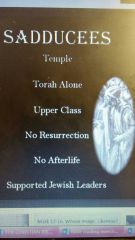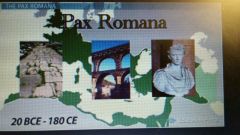![]()
![]()
![]()
Use LEFT and RIGHT arrow keys to navigate between flashcards;
Use UP and DOWN arrow keys to flip the card;
H to show hint;
A reads text to speech;
16 Cards in this Set
- Front
- Back
- 3rd side (hint)
|
Apocalypticism |
The religious belief that there will be an apocalypse, a term which originally referred to a revelation of God's will, but now usually refers to the belief that the world will come to an end very soon , even within one's own lifetime. |

|
|
|
Hellenism |
The national character or culture of Greece, especially ancient Greece. The study or imitation of ancient Greek culture. |
|
|
|
Maccabees |
The members of followers of the family of the Jewish leader Judas Maccabaeus. |
|
|
|
Sadducees |
A member of a Jewish sect or party of the time of Jesus Christ that denied the resurrection of the dead, the existence of spirits, and the obligation of oral tradition, emphasizing acceptance of the written Law alone. |

|
|
|
Pharisees |
A member of an ancient Jewish sect, distinguished by strict observance of the traditional and written law, and commonly held to have pretensions to superior sanctity. |

|
|
|
Essenes |
A member of an ancient Jewish ascetic sect somewhat resembling the Pbarisees. They affected great purity. They are widely regarded as the authors of the Dead Sea Scrolls. |
|
|
|
Pax Romana |
The peace that existed between nationalities within the Roman Empire |

|
|
|
Parables |
A simple story used to illustrate a moral or spiritual lesson, as told by Jesus in the Gospels. |

|
|
|
Kingdom of God |
One of the key elements of the teachings of Jesus in the New Testament. The presence and coming of the Kingdom of God was the central message of Jesus. |
"God's people in God's place under God's rule." |
|
|
Realized/Realizing Eschatology |
A Christian eschatological theory popularized by C.H. Todd (1884-1973) that holds that the eschatological passages in the New Testament do not refer to the future, but instead refer to the ministry of Jesus and his lasting legacy. |
Eschatology is not the end of the world but it's rebirth instituted by Jesus and continued by his disciples. Eschatology should be about being engaged in the process of becoming, rather than waiting for external and unknown forces to bring about the destruction (apocalypse). |
|
|
Healing |
The bringing about a state of physical or spiritual health. Scripture recognises a close link between physical and spiritual health, with healing often being seen as an image of salvation in Christ. |
|
|
|
The Passion |
The Passion of Christ is the story of Jesus Christ's arrest, trial and suffering. It ends with his execution by crucifixion. |
The word Passion comes from the Latin word for suffering. |
|
|
Evangelion |
In Christian Churches this term refers to a Gospel Book, concerning liturgical volumes containing one or more biblical gospel accounts. |
|
|
|
3 overarching questions concerning Jesus |
... |
|
|
|
Incarnation |
The belief that the second person of the trinity, God the Son, became flesh by being conceived in the womb of Mary. |
|
|
|
Are the Gospels histories? |
No, it is significant interpretation by the early Christians. |
|

